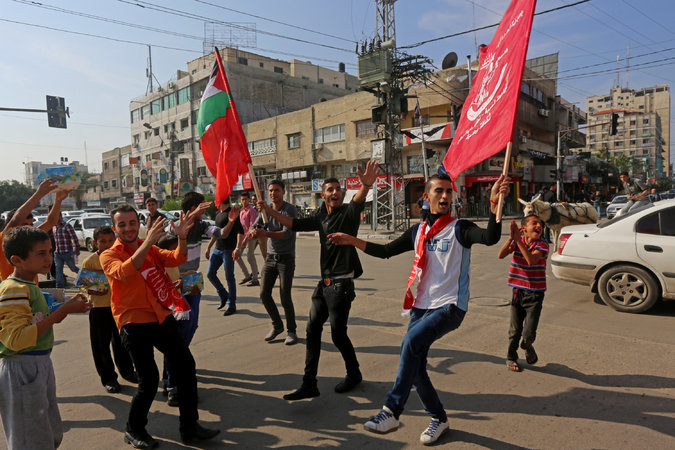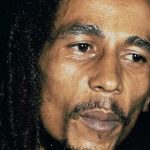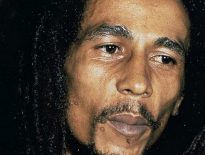JERUSALEM — Amid the condemnations from all corners of Tuesday’s deadly attack at a Jerusalem synagogue, there were also disturbing signs of celebration. A cartoon of a bloody meat cleaver like the one used in the attack that killed four Orthodox Jews circulated on social media. Residents of the Gaza Strip paraded in the streets singing victory songs, giving out candy, waving flags.

The cartoon was captioned, For you, oh Aqsa, a reference to the contested Old City holy site at the heart of a recent violent escalation that increasingly seems to be beyond the control of Israeli or Palestinian leaders. That blood splattered the victims’ prayer shawls and holy books underscored growing indications that extremists on both sides are turning the stalemated battle over territory and identity into a full-throated religious war.
Israel Shaken by 5 Deaths in Synagogue AssaultNOV. 18, 2014
The funeral of Rabbi Moshe Twersky, below, one of four men killed Tuesday in their synagogue. A Druse traffic officer died outside.Jewish Victims, All From One Jerusalem Street, Were a Congregation’s ‘Wise Scholars’NOV. 18, 2014
Once again, the assailants were believed to have acted alone, a deep new challenge to Israeli intelligence services.
Once again, they were Palestinian residents of East Jerusalem, with Israeli identification cards that allowed them to move freely, and a host of grievances about their treatment in a restive patch of fiercely disputed turf.
And once again, Israel announced a crackdown, promising to demolish attackers’ homes, blocking roads to some Palestinian neighborhoods, stepping up arrests of stone-throwing youths and bolstering police patrols.
Even Israelis who saw these security measures as necessary worried they could incite a backlash among a population that has been teeming with outrage since summer’s start. Analysts on both sides worried that the cycle of violence and mutual dehumanization would be compounded by the growing focus on the holy site, where the ancient temples once stood and where Muslims have worshiped for centuries and now fear a Jewish takeover.
When you bring the religious dimension, it absolutizes the conflict — you can divide land, you can divide security, but the sacred is indivisible, said Moshe Halbertal, a philosophy scholar at Hebrew University. And it also globalizes the conflict, because it’s every Muslim, it’s not anymore an Israeli-Palestinian conflict.
Zakaria Al-Qaq, a professor of national security studies at Al Quds University in East Jerusalem, said he saw signs that we were infected with the same disease of the region, referring to sectarian battles among Muslims tearing apart Syria, Iraq and other places.
With the religion, there is black and white, either-or, it will be existential, he said. I’m afraid when we go to the existential or either-or, it will be a kind of grinding blood all the time rather than grinding talks. It will have a different dimension and it will have a different logic, and I don’t think the existing leadership will be able to influence it.
Though President Mahmoud Abbas of the Palestinian Authority condemned the synagogue killings, other leaders praised them as a defense of Al Aqsa, the mosque at the heart of the holy site that Muslims call the Noble Sanctuary and Jews the Temple Mount. And Mr. Abbas, who last week warned that a holy war would ensue if Jews contaminated the site, couched his condemnation on Tuesday in a continued demand to stop incitement against Aqsa. He also mentioned a recent arson at a West Bank mosque (a firebomb was thrown at an old synagogue in an Arab-Israeli town on the same day).
Prime Minister Benjamin Netanyahu was one of many Israeli politicians to blame Tuesday’s terrorist attack on Mr. Abbas’s recent calls to defend the holy site, and emphasized the religious overtones himself. Four innocent and pure Jews, he said, were slaughtered while wrapped in tallit and tefillin, the prayer shawls and leather straps that Orthodox men don daily during prayer.
Mr. Netanyahu’s repeated declarations that he would not change the status quo at the holy site, where non-Muslim prayer is prohibited, have been dismissed by many Palestinians because ministers in his government and members of his political party are among those who have made provocative visits, backed legislation to divide it and even called to erect a Third Temple on the site. Beyond the mosque, Palestinians have been protesting Mr. Netanyahu’s planned expansion of Jewish settlements in East Jerusalem neighborhoods, demolition of houses in Palestinian ones and general treatment of the city’s 300,000 non-Jewish residents.
Israel captured East Jerusalem in the 1967 war, later annexed it, and considers the entire city its undivided and eternal capital. Palestinians — and most of the world — consider East Jerusalem illegally occupied territory, and the capital of their future state.
Somebody needs to think of removing the causes for this, and the causes are rooted within the Israeli policies and practices in East Jerusalem, said Ghassan Khatib, vice president of Birzeit University in the West Bank. Whether the escalation continues, he added, depends on the way Israel is going to handle this wave.
They can handle it in the same arrogant way of using force, and if it doesn’t work, you go to more force, he said. This is the recipe that accelerated all previous waves of violence into full-fledged intifadas.
Mr. Khatib pointed out that poverty, unemployment, addiction and many other socioeconomic plagues were far worse in East Jerusalem than in the West Bank; To give one stark example, he said 40 percent of Palestinian students in Jerusalem drop out of high school, compared with 0.4 percent of their West Bank counterparts.
The two sides need to do things, but the Israelis need to do more because the Palestinian officials do not have any say in East Jerusalem, he argued. In West Bank, things seem to be calmer, under the Palestinian Authority, so I think Israel is to be blamed more than the Palestinian side in this particular situation.
Far more than after earlier attacks, statements of horror poured in from politicians around the world, human-rights groups that more often condemn Israeli actions, seemingly every significant Jewish group in the United States and, notably, the Washington-based Council on American-Islamic Relations. It invoked the Quran’s description of synagogues as places in which God’s praise is celebrated daily.
At the site of the attack, Kehilat Bnei Torah in the ultra-Orthodox neighborhood Har Nof, memorial candles were arranged to spell House of God in Hebrew.
It is, of course, not the first time the conflict has spilled into religious sanctuaries. Tuesday’s attack was reminiscent of the 2008 killing of eight Jewish students at a Jerusalem yeshiva. In a 1994 massacre at the Cave of the Patriarchs in Hebron, an Israeli extremist killed 29 Muslim worshipers. Jewish vandalism against mosques is a regular occurrence.
What feels different in the last couple of months in Jerusalem is the intimacy of the terror, said Yossi Klein Halevi, an author and fellow at Jerusalem’s Shalom Hartman Institute. There’s nothing impersonal about this. This isn’t a suicide bomber strapping dynamite on his torso and blowing himself up on a crowded bus, or Hamas firing rockets into a population center.
This is a war of neighbors, he said. And the religious dimension makes it even more horrifying.





